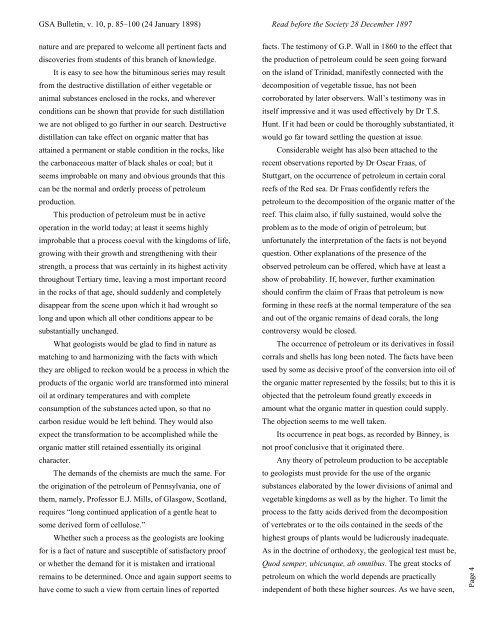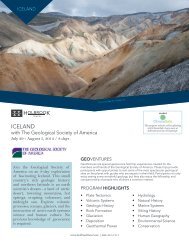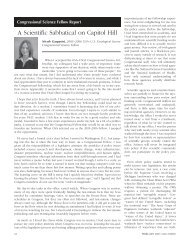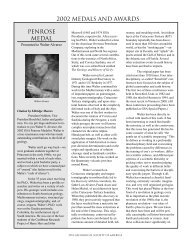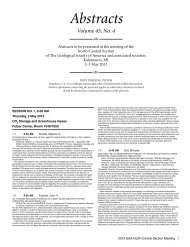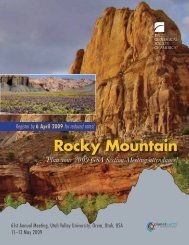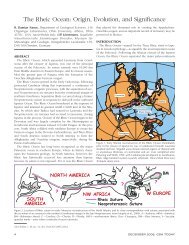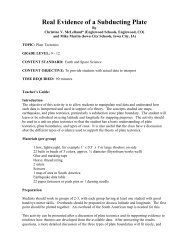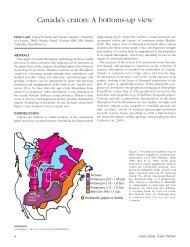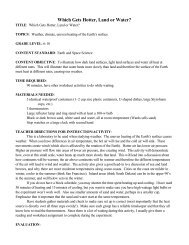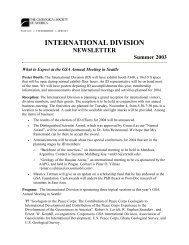Presidential Address - Geological Society of America
Presidential Address - Geological Society of America
Presidential Address - Geological Society of America
You also want an ePaper? Increase the reach of your titles
YUMPU automatically turns print PDFs into web optimized ePapers that Google loves.
GSA Bulletin, v. 10, p. 85–100 (24 January 1898) Read before the <strong>Society</strong> 28 December 1897<br />
nature and are prepared to welcome all pertinent facts and<br />
discoveries from students <strong>of</strong> this branch <strong>of</strong> knowledge.<br />
It is easy to see how the bituminous series may result<br />
from the destructive distillation <strong>of</strong> either vegetable or<br />
animal substances enclosed in the rocks, and wherever<br />
conditions can be shown that provide for such distillation<br />
we are not obliged to go further in our search. Destructive<br />
distillation can take effect on organic matter that has<br />
attained a permanent or stable condition in the rocks, like<br />
the carbonaceous matter <strong>of</strong> black shales or coal; but it<br />
seems improbable on many and obvious grounds that this<br />
can be the normal and orderly process <strong>of</strong> petroleum<br />
production.<br />
This production <strong>of</strong> petroleum must be in active<br />
operation in the world today; at least it seems highly<br />
improbable that a process coeval with the kingdoms <strong>of</strong> life,<br />
growing with their growth and strengthening with their<br />
strength, a process that was certainly in its highest activity<br />
throughout Tertiary time, leaving a most important record<br />
in the rocks <strong>of</strong> that age, should suddenly and completely<br />
disappear from the scene upon which it had wrought so<br />
long and upon which all other conditions appear to be<br />
substantially unchanged.<br />
What geologists would be glad to find in nature as<br />
matching to and harmonizing with the facts with which<br />
they are obliged to reckon would be a process in which the<br />
products <strong>of</strong> the organic world are transformed into mineral<br />
oil at ordinary temperatures and with complete<br />
consumption <strong>of</strong> the substances acted upon, so that no<br />
carbon residue would be left behind. They would also<br />
expect the transformation to be accomplished while the<br />
organic matter still retained essentially its original<br />
character.<br />
The demands <strong>of</strong> the chemists are much the same. For<br />
the origination <strong>of</strong> the petroleum <strong>of</strong> Pennsylvania, one <strong>of</strong><br />
them, namely, Pr<strong>of</strong>essor E.J. Mills, <strong>of</strong> Glasgow, Scotland,<br />
requires “long continued application <strong>of</strong> a gentle heat to<br />
some derived form <strong>of</strong> cellulose.”<br />
Whether such a process as the geologists are looking<br />
for is a fact <strong>of</strong> nature and susceptible <strong>of</strong> satisfactory pro<strong>of</strong><br />
or whether the demand for it is mistaken and irrational<br />
remains to be determined. Once and again support seems to<br />
have come to such a view from certain lines <strong>of</strong> reported<br />
facts. The testimony <strong>of</strong> G.P. Wall in 1860 to the effect that<br />
the production <strong>of</strong> petroleum could be seen going forward<br />
on the island <strong>of</strong> Trinidad, manifestly connected with the<br />
decomposition <strong>of</strong> vegetable tissue, has not been<br />
corroborated by later observers. Wall’s testimony was in<br />
itself impressive and it was used effectively by Dr T.S.<br />
Hunt. If it had been or could be thoroughly substantiated, it<br />
would go far toward settling the question at issue.<br />
Considerable weight has also been attached to the<br />
recent observations reported by Dr Oscar Fraas, <strong>of</strong><br />
Stuttgart, on the occurrence <strong>of</strong> petroleum in certain coral<br />
reefs <strong>of</strong> the Red sea. Dr Fraas confidently refers the<br />
petroleum to the decomposition <strong>of</strong> the organic matter <strong>of</strong> the<br />
reef. This claim also, if fully sustained, would solve the<br />
problem as to the mode <strong>of</strong> origin <strong>of</strong> petroleum; but<br />
unfortunately the interpretation <strong>of</strong> the facts is not beyond<br />
question. Other explanations <strong>of</strong> the presence <strong>of</strong> the<br />
observed petroleum can be <strong>of</strong>fered, which have at least a<br />
show <strong>of</strong> probability. If, however, further examination<br />
should confirm the claim <strong>of</strong> Fraas that petroleum is now<br />
forming in these reefs at the normal temperature <strong>of</strong> the sea<br />
and out <strong>of</strong> the organic remains <strong>of</strong> dead corals, the long<br />
controversy would be closed.<br />
The occurrence <strong>of</strong> petroleum or its derivatives in fossil<br />
corrals and shells has long been noted. The facts have been<br />
used by some as decisive pro<strong>of</strong> <strong>of</strong> the conversion into oil <strong>of</strong><br />
the organic matter represented by the fossils; but to this it is<br />
objected that the petroleum found greatly exceeds in<br />
amount what the organic matter in question could supply.<br />
The objection seems to me well taken.<br />
Its occurrence in peat bogs, as recorded by Binney, is<br />
not pro<strong>of</strong> conclusive that it originated there.<br />
Any theory <strong>of</strong> petroleum production to be acceptable<br />
to geologists must provide for the use <strong>of</strong> the organic<br />
substances elaborated by the lower divisions <strong>of</strong> animal and<br />
vegetable kingdoms as well as by the higher. To limit the<br />
process to the fatty acids derived from the decomposition<br />
<strong>of</strong> vertebrates or to the oils contained in the seeds <strong>of</strong> the<br />
highest groups <strong>of</strong> plants would be ludicrously inadequate.<br />
As in the doctrine <strong>of</strong> orthodoxy, the geological test must be,<br />
Quod semper, ubicunque, ab omnibus. The great stocks <strong>of</strong><br />
petroleum on which the world depends are practically<br />
independent <strong>of</strong> both these higher sources. As we have seen,<br />
Page 4


